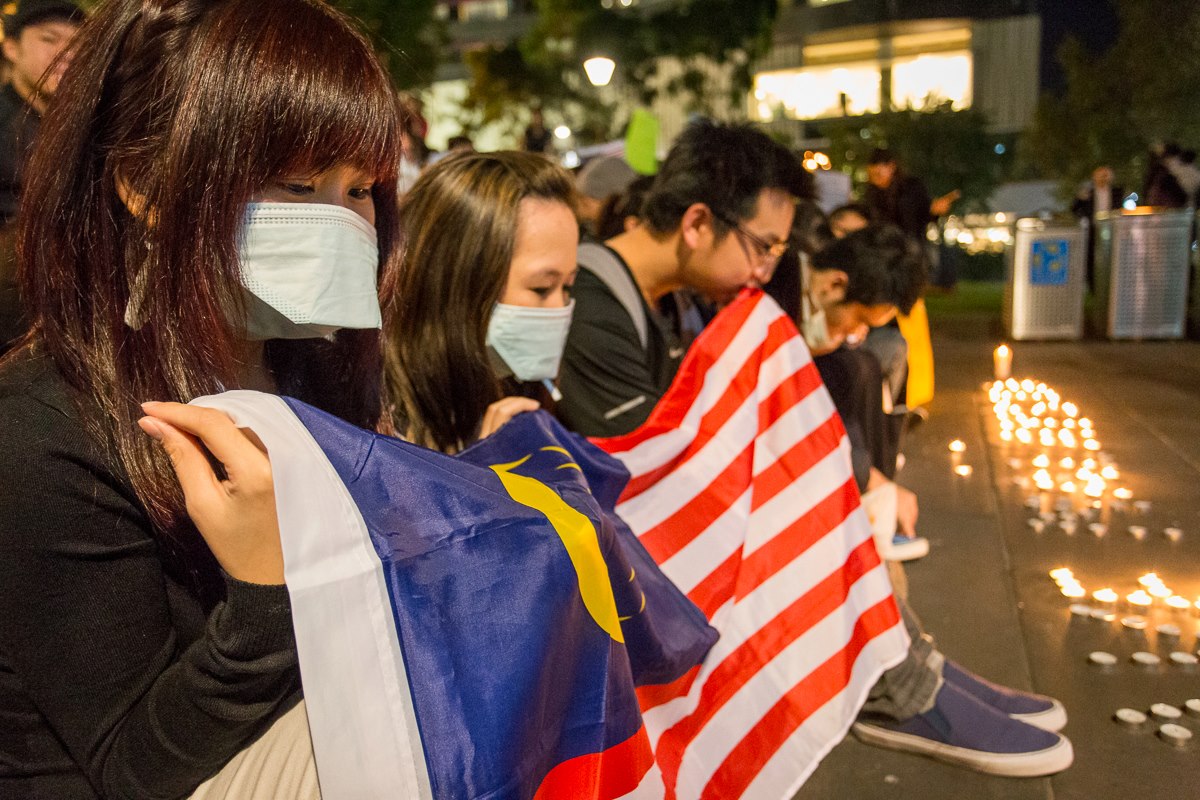Malaysian General Election 2013: Students in Melbourne speak out
WEEKS after Malaysia’s 13th general election, claims of electoral fraud continue to cloud the ruling government’s victory. Jing Wei Lee speaks to Malaysian students in Melbourne for their reactions.

Post election. In Melbourne, Malaysians gathered on May 8 outside the State Library of Victoria to protest against what they believe to be a corrupted electoral system. Photo: LeBin Teo
It has been a few weeks since Malaysia held its 13th general elections, but discontent is still rife.
The election process and returning victory of the ruling Barisan Nasional coalition (BN) has sparked allegations of fraud, which are denied by the ruling government.
The most important thing everyone was hoping for was a clean election, which we don’t think happened this time round. – Shu Ee Wee, President of Malaysians of Melbourne University (MoMU)
The government attracted less than half the popular vote to win 133 seats compared to the opposition’s 89 seats in its worst electoral performance since the country gained independence from Britain in 1957.
Following the elections, rallies were staged across various Malaysian cities, including Penang, Kuala Lumpur and Johor Bahru, which were attended by tens of thousands.
On May 25, a rally in Kuala Lumpur was attended by former Deputy Prime Minister and leader of the opposition alliance Pakatan Rakyat Datuk Seri Anwar Ibrahim, who demanded that the Election Commission officials resign immediately.
 In Melbourne, Malaysians also gathered on May 8 outside the State Library of Victoria to protest against what they believe to be a corrupt electoral system.
In Melbourne, Malaysians also gathered on May 8 outside the State Library of Victoria to protest against what they believe to be a corrupt electoral system.
Malaysians of Melbourne University (MOMU) president Shu Ee Wee, said an absence of an open and fair election is the root of their discontent.
“To me, it doesn’t matter if you support BN or Pakatan, because each party performs differently in different states,” she said.
Director for the Centre of Independent Journalism Malaysia Sonia Randhawa listed the issue of phantom voters and poor quality indelible ink as some of the problems in the latest election.
She explained that issues such as gerrymandering and malapportionment were already part of the electoral system before the 2013 elections.
Gerrymandered constituencies meant that with less than 47 per cent of the popular vote, BN still won 60 per cent of the 222 parliamentary seats.
As a voter, Ms Randhawa also encountered issues relating to the transparency of the postal voting system.
When her sister went to a polling station in Melbourne to deliver their ballots, station officers did not provide any written receipt.
Furthermore, she noted the address on the envelope containing their ballot slip was different from the one that the opposition parties were told to monitor.
“These problems allow for the possibility of fraud in the election system.” Ms Randhawa said.
However, some students admit one had to discern between rumours and legitimate claims of electoral fraud.
One of the allegations which spread via social media concerned the staging of blackouts to smuggle extra votes into the counting stations. This occurrence was given the phrase ‘magic blackout’ by disbelieving Malaysians.
“I’m a bit sceptical as to whether there were blackouts at any of the counting stations because there are conflicting sources of information on social media.” Malaysian student Keefe Chan said.
For Mr Chan, a BN government makes him less willing to return to Malaysia after his studies are completed.
I only envision myself living in a state where I am treated as a second-class citizen, working in an inefficient, bureaucratic, crony capitalist economy.
“BN does not seem to have any incentive for reform whatsoever – if anything they seem to be getting more and more radical and racist. I only envision myself living in a state where I am treated as a second-class citizen, working in an inefficient, bureaucratic, crony capitalist economy. I also expect public institutions like schools, the courts and the police to be in an even worse state.
“Granted, life won’t be unbearable but when Australia is an alternative, there is little incentive to stay.” he said.
On the other hand, Ms Wee from MoMU believes in taking a more positive approach towards politics in Malaysia.
We need to work together in unity across the nation and with Malaysians around the world to find ways to make the next election cleaner.
“We need to work together in unity across the nation and with Malaysians around the world to find ways to make the next election cleaner,” she said.
“We need to look at how the election commission operates at the moment. People need to identify and see what the problem was. Identify the ones who were not doing their job properly, and try to keep yourself in the loop of what is happening in the news. If there’s a chance to voice out, you should voice out so that everyone is aware of everything.”

